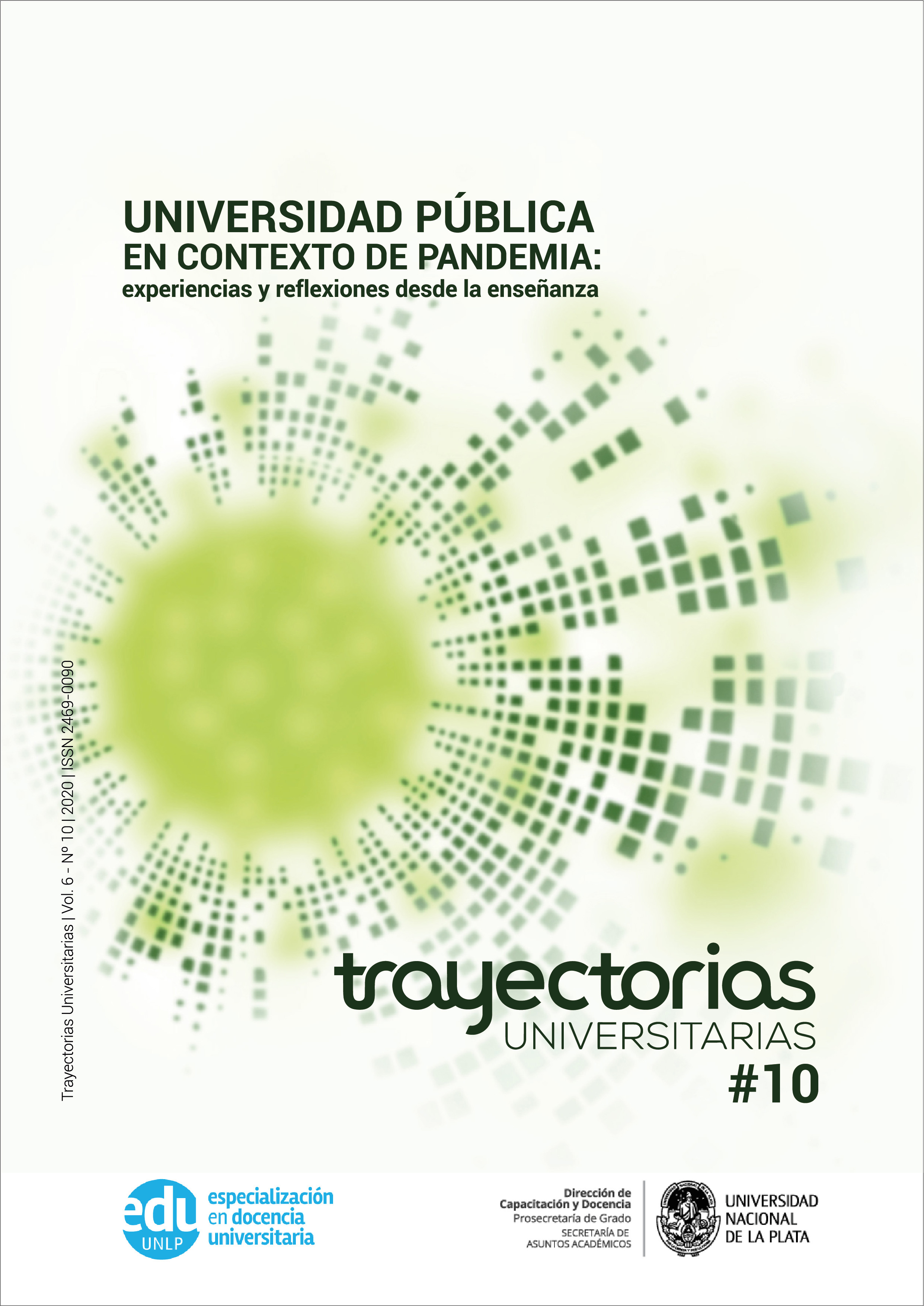Virtual classes in university entrance: the emergency in the construction of meaning
DOI:
https://doi.org/10.24215/24690090e022Keywords:
Pedagogical Continuity - Forced Virtuality - Virtual Classes - Grounded theoryAbstract
The current situation in which the world finds itself, since the declaration of a pandemic by COVID-19, has meant - and still means - a context of great challenge for "pedagogical continuity" in the entire field of education. The university level is far from being exempt from this situation. Relying on the university autonomy that empowers it, it has decided in various ways to attend and respond to guarantee the universal right to education. Within this framework, the National Arturo Jauretche University -after UNAJ-, has analyzed in detail, which were the subjects that could, with the limitations of the case, make an offer of classes through virtual classrooms.
In this review of ongoing research, we will give an account of the process that we have started from a questionnaire on teaching expectations for the teachers of the subjects that make up the initial cycle of UNAJ. The processing of the first results has generated different questions about this context of forced virtuality that we have to go through: how will the conditions of home confinement and accessibility to digital technologies for teaching and learning in this context affect teachers and students? pedagogical continuity framework? To what extent will the lack of experience of teachers and students in virtual environments be an obstacle to teaching and learning? What is a virtual class in this framework? How to define its spatio-temporal limits? How can expectations be reconciled between what teachers offer to sustain teaching with what students expect to receive? These are some of the many questions that are beginning to emerge from the work dynamics. In particular, in this presentation we will try to begin to delineate the emerging elements in order to elaborate an answer regarding the construction of meanings in a "virtual class" starting from appealing to a possible definition from the methodology of grounded theory based on the analysis of what teachers understand and assume is a virtual class in this context.
KEY WORDS: Pedagogical Continuity - Forced Virtuality - Virtual Classes - Grounded theory.
Downloads
Metrics
References
Glaser B. & Strauss A. (1967). “The discovery of grounded theory: Strategies for qualitative research”. New Brunswick, NJ: Aldine Transaction.
Glaser B. (1978). “Theoretical sensitivity: advances in the methodology of grounded theory”, Mill Valley, Sociology Press.
Glaser B. (2000). “The discovery of the grounded theory”, Mill Valley, Sociology Press.
Glaser B. (2002). “Conceptualization: On theory and theorizing using grounded theory”. International Journal of Qualitative Methods, 1 (2). Article 3. Disponible en https://journals.library.ualberta.ca/ijqm/index.php/IJQM/article/view/4605
Gueudet, G. & Trouche, L. (2009). “Towards new documentation systems for mathematics teachers?” Educational Studies in Mathematics, 71(3), 199-218.
Lora A.A., Cavadias, L. M. & Miranda, A. J. (2017). “La Teoría Fundamentada en el Marco de la Investigación”. Educativa. Saber, ciencia y libertad, 12(1), 10.
Orozco, J. (2013). “La Virtualidad en Educación Superior: Una Perspectiva. XIV Encuentro Internacional Virtual”. Educa Colombia 2013. Recuperado de: http://www.virtualeduca.info/ponencias2013/171/LavirtualidadenESUnaperspectivaJairoL.pdf
Smith, L. T. (2012). “Decolonizing methodologies: Research and indigenous peoples”. London, United Kingdom: Zed Books.
Stringer, E. (2013). “Action Research”. Thousand Oaks, CA: SAGE.
Downloads
Published
How to Cite
Issue
Section
License
La aceptación de un original por parte de la revista implica la cesión no exclusiva de los derechos patrimoniales de los/as autores/as en favor del editor, quien permite la reutilización, luego de su edición (postprint), bajo una Licencia Creative Commons Atribución-NoComercial-CompartirIgual 4.0 Internacional (CC BY-NC-SA 4.0).
Acorde a estos términos, el material se puede compartir (copiar y redistribuir en cualquier medio o formato) y adaptar (remezclar, transformar y crear a partir del material otra obra), siempre que a) se cite la autoría y la fuente original de su publicación (revista y URL de la obra), b) no se use para fines comerciales y c) se mantengan los mismos términos de la licencia.
La cesión de derechos no exclusivos implica que luego de su edición (postprint) en Trayectorias Universitarias los/as autores/as pueden publicar su trabajo en cualquier idioma, medio y formato; en tales casos, se solicita que se consigne que el material fue publicado originalmente en esta revista.
Tal cesión supone, también, la autorización de los/as autores/as para que el trabajo sea cosechado por SEDICI, el repositorio institucional de la Universidad Nacional de La Plata, y sea difundido en las bases de datos que el equipo editorial considere adecuadas para incrementar la visibilidad de la publicación y de sus autores/as.
Asimismo, la revista incentiva a los/as autores/as para que luego de su publicación en Trayectorias Universitarias depositen sus producciones en otros repositorios institucionales y temáticos, bajo el principio de que ofrecer a la sociedad la producción científica y académica sin restricciones contribuye a un mayor intercambio del conocimiento global.





















